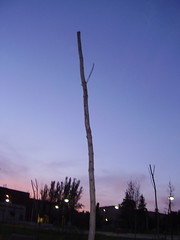Finding Short Cuts in Databases
The exercise this week was quite useful for me because I've been working on a research paper and I knew exactly what I needed to find. I have already done the bulk of the work and have my primary sources from my research in El Salvador over the summer. In a nutshell, my paper focuses on how the use of sacred space has changed in El Salvador from 1950 to 1980, using the Metropolitan Cathedral as a case study. It burnt down in 1951 and remained in a perpetual state of incompleteness throughout the decades in which there was political upheaval from within the ranks of the clergy. It was the place where hundreds of thousands of people gathered every year to celebrate the patron saint, the Divine Savior, which when translated is the name of the country--El Salvador. The patron saint was always invoked as a symbol of "salvadoranness" and I examine how the meanings inscribed in the image (and its "home" in the cathedral) changed throughout the years.
I've already done that part. But there was one key thing that I needed to find in order to make my argument. I knew for a fact (through talking to people and passing mention of this in my other sources) that the Cathedral had been "taken" by popular organizations, sometimes armed, sometimes peaceful, almost fifty times from 1970 to 1985. These takeovers usually went on for days; sometimes government forces bombed the Cathedral to get the people out; and the organizations' explicit aim was usually to make their voices heard when there was no other place to voice dissent. I knew this, but I needed to find sources to back me up, as well as the specific dates of the takeovers in order to compare them to the dairies and collections of homilies that I have of the archbishops.
Now, if I were in El Salvador I would probably just go to the national archive and skim through ten years' worth of newspapers. It would take a long time. The good thing about this time period is that it created a political climate in which the United States was clearly interested in the goings-on of the popular organizations. So I figured some sort of report would make it into the major newspapers. I went to ProQuest and did a search for "cathedral el salvador." Although I only got four hits (they only seemed to report on the takeovers when they involved some sort of bloodshed), it was a good place to start, since I then knew which ones had been the most significant. The filter of the U.S. press therefore made it easier to know which takeovers had loomed larger than the others. ProQuest newspapers, because it searches all the text, is extremely useful in this regard. It is incredibly user-friendly, and if you have a detailed enough search you probably won't be overwhelmed with hits. However, that was not enough. There had been 48 takeovers during the period I was interested in and I only had record of four.
Where to look next? Google was useless, and so were all the databases of scholarly articles, even the ones centered on Latin America. Finally I had an idea. The U.S. State Department archives! There are several and for my purposes FRUS just didn't work in terms of searchability. Then I found the Digital National Security Archive. It has four possible searches: documents, bibliography, chronology, and glossary. I did a search for documents with the key words "cathedral el salvador" and got a long string of results. The documents were mostly weekly reports sent from the Embassy to the State Department regarding the meaningful events of the week. The citation includes a list of the people mentioned, the subject-matter (such as violence, disappeared persons, political prisoners, takeovers, and YES, National Cathedral). You click on the document and you have a scanned image of the original report. Because the U.S. was carefully monitoring the situation, the reports just mentioned in passing what was going on in the Cathedral, who had said what, and the date. This was perfect, since I could then both refer back to the diary entries and homilies for that date, know what the U.S. Embassy was up to, and look up the newspapers for those specific dates.
In sum, I think that for my purposes, it is very difficult to construct any research based solely on online databases, because the "meat" of what I'm looking for is just not in a database. However, they really provide ways in which to direct and fine tune my research that I probably would not be able to accomplish with print sources alone. I can't imagine consulting print copies of the New York Times, etc, just to find one or two articles regarding the Cathedral, but because it's so easy, I can do it in ten minutes, and it enhances my searches elsewhere. Likewise, I would never think to look for State Department records for information on El Salvador (the 'filtering' effect would drive me crazy), but if I know exactly what I'm looking for, it provides invaluable information that it would be difficult to find so easily elsewhere.


0 Comments:
Post a Comment
<< Home